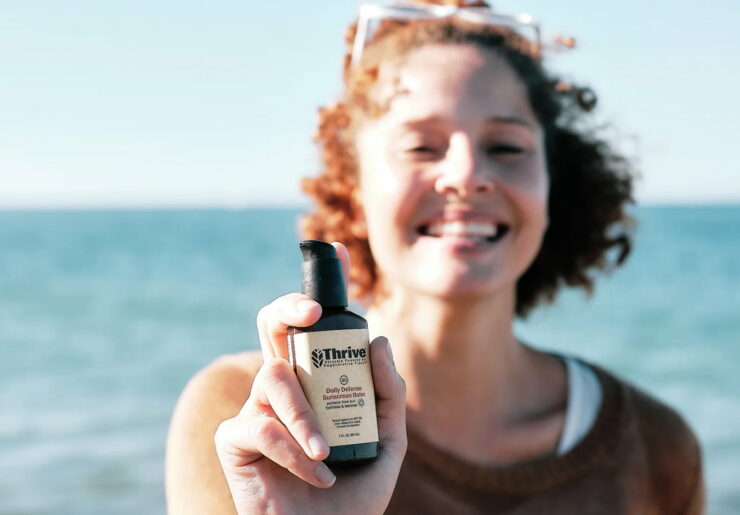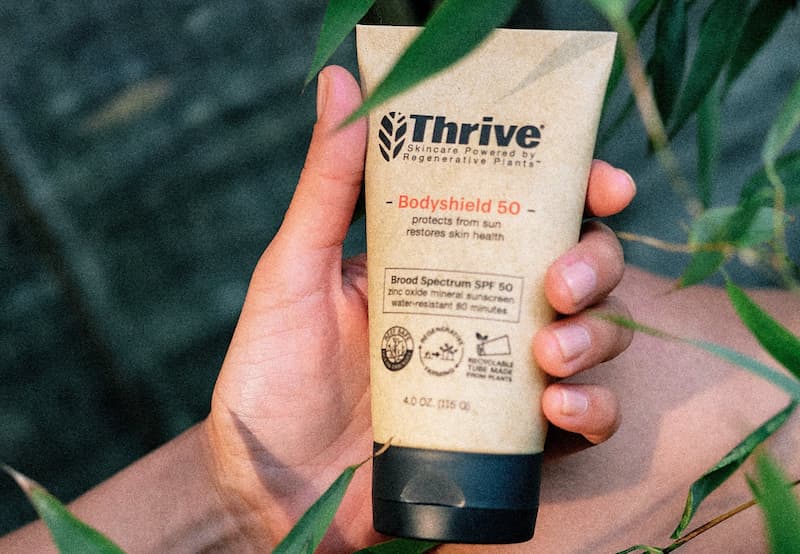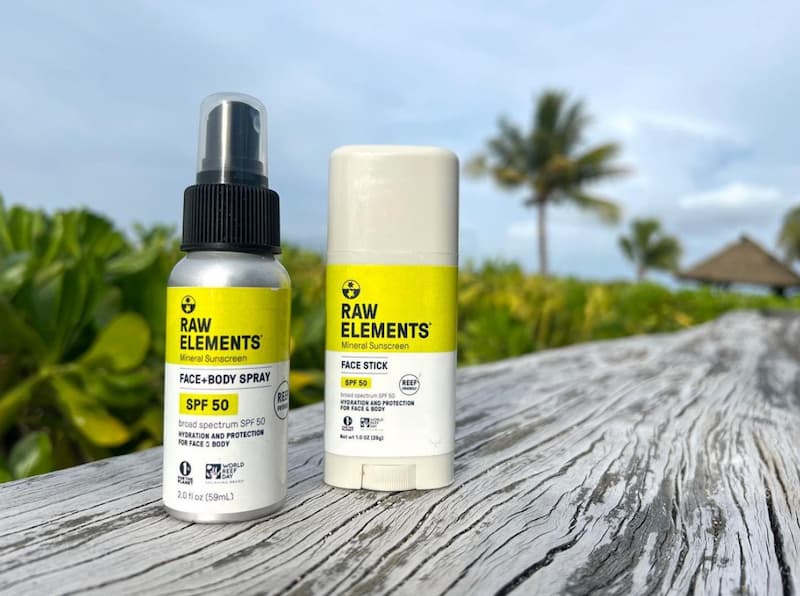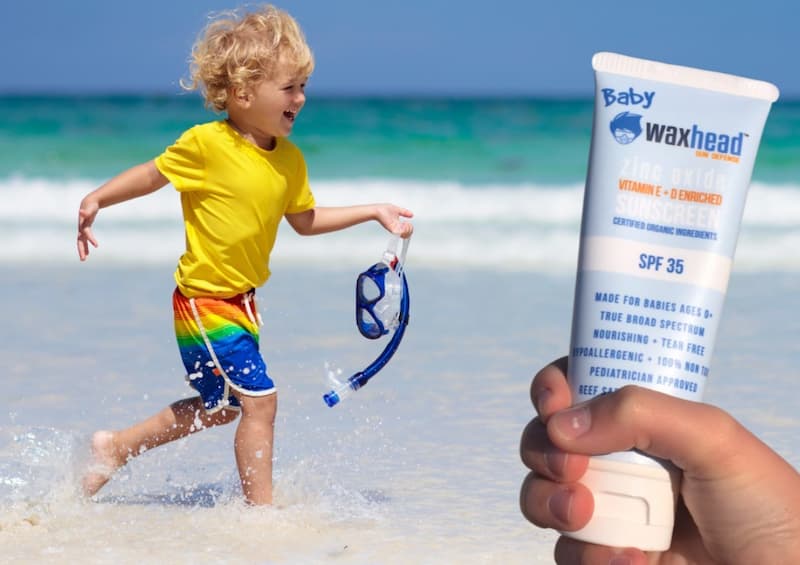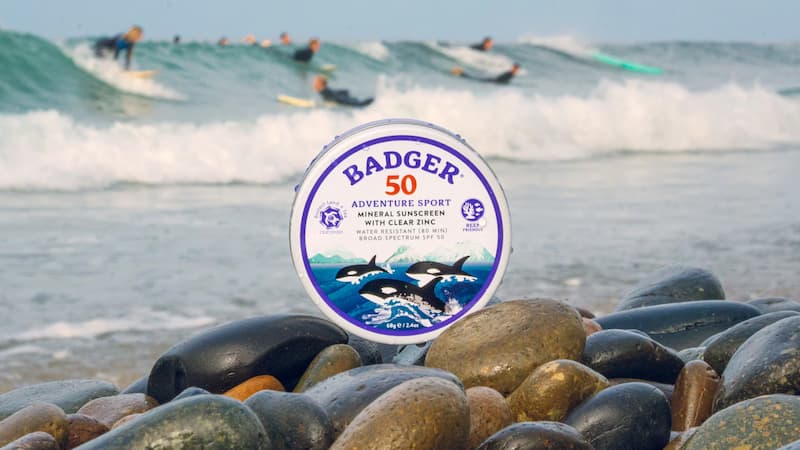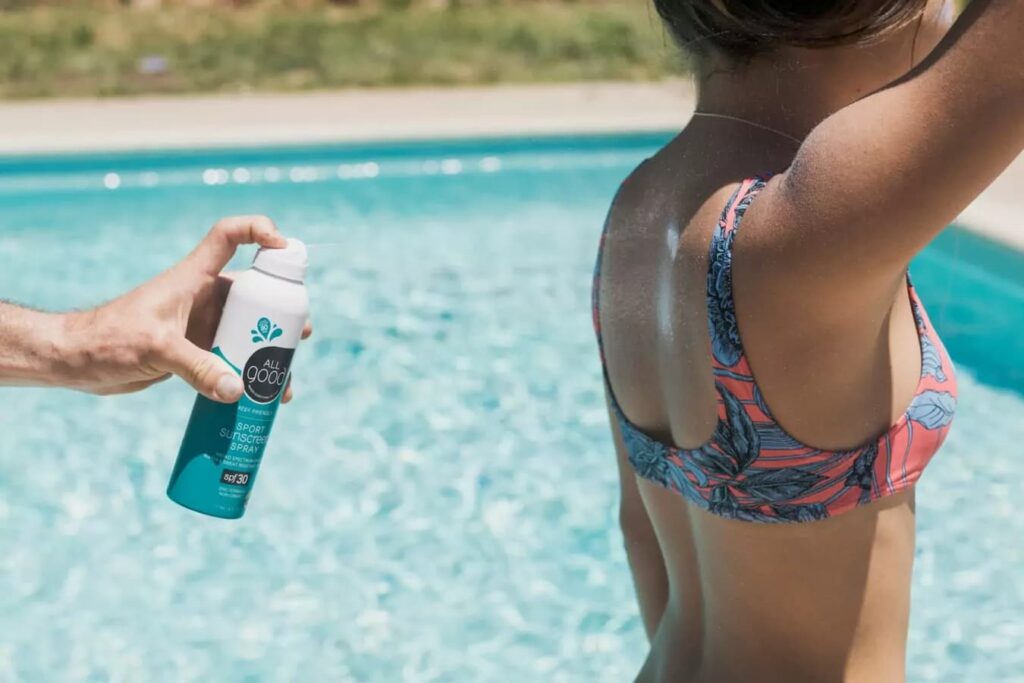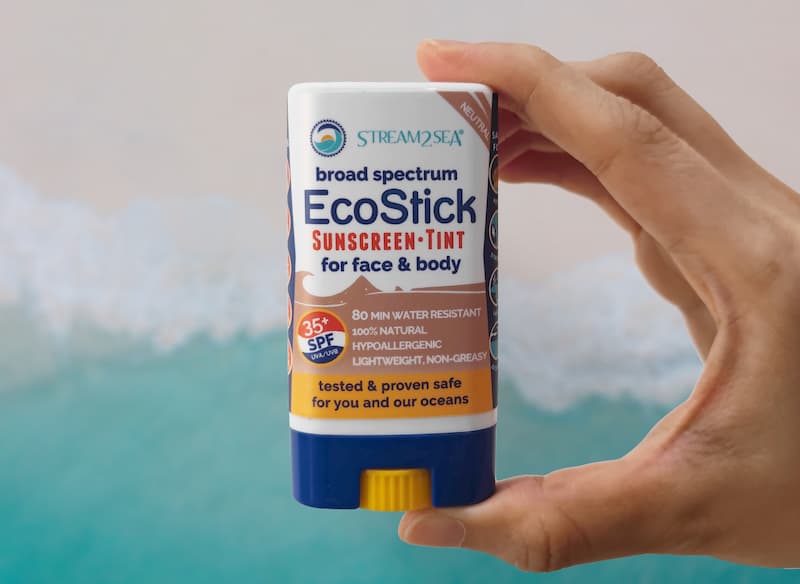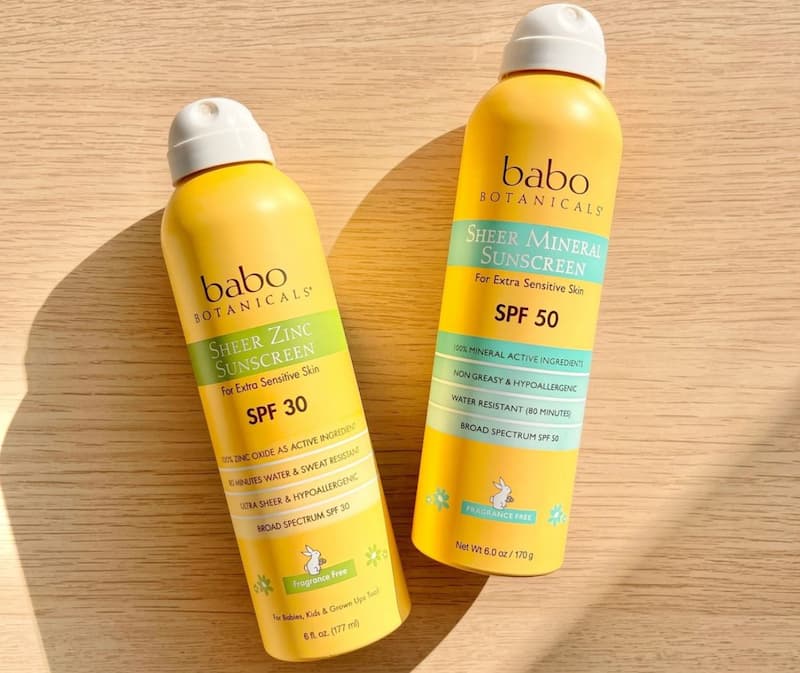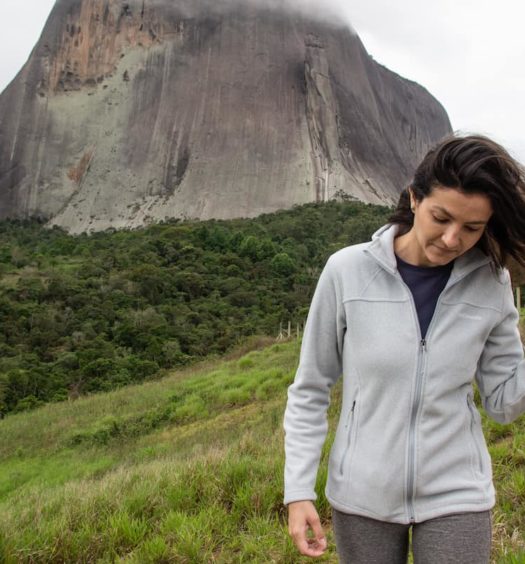Natural & Reef-safe Sunscreen: Eight biodegradable and eco-friendly brands
Could the sunscreen you pack in your travel essentials harm your health or the environment? Being a responsible traveler involves making good choices in daily life and even in terms of what we pack in our bags. Regarding sunscreen, it’s worth considering a more natural, biodegradable, or at least reef-friendly solution compared to the conventional ones.
In this article, you’ll discover the risks of chemical sunscreen, what natural sunscreen is, and find a list of Reef-safe Sunscreen: eight brands that are natural and reef-friendly. Ready?
If you prefer, go straight to the topic of interest:
Disadvantages of chemical sunscreen
Studies indicate that the formulas of conventional (chemical) sunscreen can cause various harm to the body and nature. Did you know that ingredients like petrolatum, benzophenone-3, avobenzone, oxybenzone, and others penetrate our skin and can enter the bloodstream, causing hormone-related problems?
As if the potential harm to humans wasn’t enough, several research studies show it also affects marine life. According to Green Gross, about 25,000 tons of sunscreen enter the oceans yearly, harming coral and other marine animals.
What is reef-safe sunscreen?
Reef-safe or reef-friendly sunscreen types are those that do not use ingredients such as oxybenzone and octinoxate, which are harmful to coral reefs. Instead, they use only mineral UV-blocking ingredients like oxide and titanium dioxide.
What is natural or biodegradable sunscreen?
With the negative impact of chemical sunscreen in mind, brands are expanding or creating lines of “clean beauty” – sunscreens with more natural and biodegradable formulas that protect our health, oceans, and the creatures that live there. For this purpose, physical sunscreen made of a mineral formula, unlike chemical sunscreen, doesn’t penetrate the skin but forms an external protective layer.
One point you must pay attention to is that it is not because it is a mineral sunscreen that it is natural. Many new options in the market for mineral sunscreen have ingredients that can be harmful. That is why we are focusing on the natural options in this article.
With this information, you’re likely wondering, “What are the best natural sunscreen brands?” After much research, we’ve compiled eight more natural and eco-friendly alternatives for your daily life and summer vacation.
Natural and reef-safe body and face sunscreen
1. Thrive Regenerative Skincare
This daily natural sunscreen with 20% zinc oxide offers a safe alternative to chemical sunscreens, providing a physical barrier to the sun. Costa Rican super-plants, antioxidants, and regenerative farmed Coralillo enrich their formula. It repairs and protects against UVA/UVB rays and environmental stressors.
The brand promises no white cast, but some customers, especially those with more melanin, claim that the non-tinted sunscreen has a good effect but does not disappear completely.
Thrive Regenerative Skincare has three types of reef-safe sunscreen: two facials – regular and for sensitive skin and one for the body. All of them have good water resistance.
Ideal for: swimming and practicing outdoor sports. Natural facial sunscreen is better for dry skin.
Coloration: non-tinted.
Pros: the effect of white cast is minimal compared to other sunscreens. It is easy to spread.
Cons: some people allege that they have an allergy to this product.
Safe for children: recommended for six-month babies and above.
Sustainability🍃: 100% natural; reef-safe sunscreen; certified plastic negative; regenerative farming.
Price: ranging from $29.90*
2. Raw Elements
With a wide range of sunscreen, Raw Elements emerged from a mission to craft the safest and most effective sunscreen on the planet with all-natural ingredients. They have a safe coral reef formula, ensuring cruelty-free products with no nano-sized particles.
On their product shelf, they have options such as non-tinted, tinted-color, solid, paste, and spray texture; body, face, lip, and kids’ natural sunscreen. All the products have good water resistance, about 80 minutes.
Ideal for: swimming and practicing outdoor sports. The facial option works better on dry skin.
Coloration: non-tinted and tinted.
Pros: it has excellent protection and a wide range of different sunscreens.
Cons: it has a thick texture.
Safe for children: they have natural sunscreen sticks and creams for babies and kids. Recommended for six-month babies and above.
Sustainability🍃: non-GMO (Genetically Modified Organism), NPA (Natural Products Association), and USDA/NOP (National Organic Program) certified. They also have zero-waste packaging options.
Price: from $14,99* to $29,95*
3. Waxhead Sun Defense
Waxhead Sun Defense, in collaboration with a top holistic biochemist, has developed a line of mineral-based certified organic sunscreens that are completely safe for marine systems, reefs, and fish. Their non-toxic formulations meet elite standards, use non-nano, uncoated French process zinc oxide, and 100% certified organic ingredients, excluding petrochemicals.
These eco-friendly, baby-safe, and reef-safe sunscreens offer broad-spectrum coverage, protecting against sunburn and deep tissue damage. They have three main product lines: for children, to practice sports, and everyday sunscreen.
Ideal for: swimming and practicing sports.
Coloration: non-tinted and two tones of tinted.
Pros: it has excellent protection.
Cons: it has a thick texture.
Safe for children: They have a natural sunscreen for kids which pediatricians often consider safe even for babies under six months. We always recommend checking with your kid’s doctor first.
Sustainability🍃: Not tested on animals. Reef-safe and biodegradable sunscreen; carbon neutral.
Price: from $25,99* to $35,99*
4. Badger
Badger prioritizes sourcing the best ingredients by connecting with the people growing and processing organic materials worldwide. Their focus on USDA (United States Department of Agriculture) certified organic ingredients reflects a commitment to high standards in personal care. Their formula is simple and natural, containing about four to nine ingredients from regenerative agriculture.
This brand has five lines of reef-safe sunscreen: active (every day), sport (more water resistance), adventure (higher percentage of zinc oxide to increased exposure to the sun), kids, and baby. Badger is a popular mineral sunscreen in the U.S. with excellent consumer acceptance.
A nice thing about Badger is that it doesn’t leave a white cast.
Ideal for: everyday swimming and practicing common or adventure sports.
Coloration: non-tinted.
Pros: it has excellent protection and doesn’t leave a white cast.
Cons: it has a fragrance and can be a problem for some people.
Safe for children: they have a version for kids and babies above six months.
Sustainability🍃: organic and fair-trade ingredients; 100% solar-powered plant; certified B-Corporation.
Price: from $14,99* to $15,99*
5. All good
All Good sunscreen is a top-tier option, offering adequate sun protection with a focus on natural ingredients. The brand’s commitment to safe skincare is evident in its mineral-based, non-nano zinc oxide formulations, free from harmful chemicals. With organic, reef-friendly ingredients, their use provides a physical barrier against the sun’s harmful rays.
Among the products available, they offer choices like solid, paste, and spray textures, catering to body, face, lip, and kids’ sunscreen needs, with SPF 30 or 50.
Ideal for: swimming and practicing sports.
Coloration: non-tinted and tinted.
Pros: it has excellent protection. It is cheaper than other natural sunscreens.
Cons: the non-tinted can leave you a white cast. It has a thick texture.
Safe for children: they have a version for kids over six months.
Sustainability🍃: biodegradable sunscreen; certified B-Corporation, Organic Ingredients, and Non-GMO materials; production facility powered by photovoltaic panels; woman-owned business.
6. Think Sun Care
With three different collections, daily, sport, and kids, Think Sun Care is a brand that brings mineral sunscreen, virtually clear and non-oily scientifically formulated eco-friendly infused with Non-Nano mineral Zinc Oxide. They are EWG-verified, which means that they meet high safety standards as regulated by the Environmental Working Groups.
Their sunscreen products, especially the sports ones, are a little heavy and can give you a white cast, but they are perfect to protect you from UVA/UVB sun rays. The water-resistant up to 80 mins, biodegradable, and reef-safe formula makes the ThinkSport sunscreen perfect for a day on the beach or in the swimming pool without caring so much with the reapplication hour by hour.
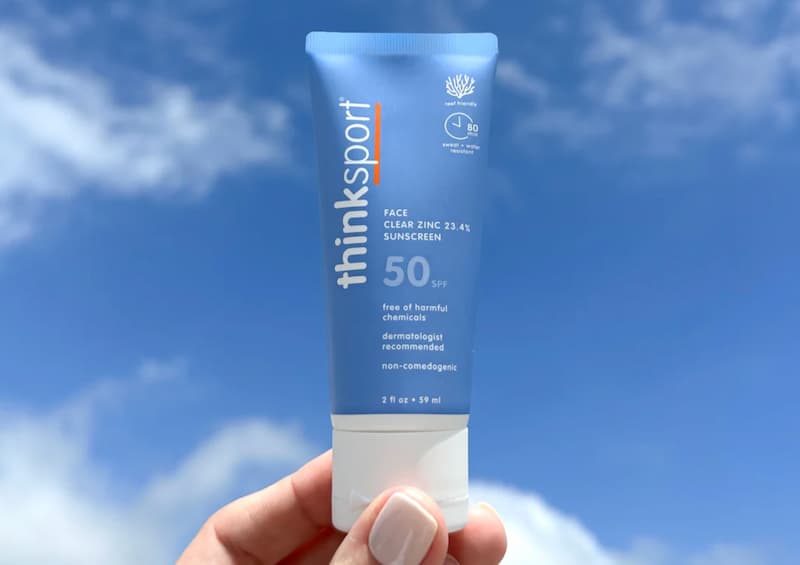
Ideal for: swimming and practicing sports.
Coloration: non-tinted, let you with a white cast.
Pros: it has excellent protection. Perfect to use in the water.
Cons: it is a little hard to spread in your body.
Safe for children: they have a version for kids over six months.
Sustainability🍃: reef-friendly sunscreen; support socially responsible organizations.
7. Stream2Sea
Stream2Sea has biodegradable sunscreen for adults and children, with everyday or sports options, which have non-tinted and tinted versions. This high-performance 100% natural sunscreen is EWG verified, uses organic ingredients, and has water resistance for up to 80 minutes; it is ideal for water activities and prevents after-sun burns.
The non-greasy, dense formula requires only a small amount, ensuring easy application. The bonus of the sunscreen is that it is really easy to apply since it spreads easily, too. The non-tinted one can give you a white cast in the beginning, but in a couple of minutes it dries and disappears in your skin.
Ideal for: those who swim and practice sports in the open air.
Coloration: non-tinted and tinted.
Pros: pretty much no white cast. Included anti-oxidants.
Cons: a shiny aspect. The mineral tint may stain clothing.
Safe for children: they have a version for kids.
Sustainability🍃: woman-owned; packaging made of recyclable sugar cane resin or PCR plastic (from recycled milk jugs); Protect Land + Sea Certified.
Price: from $19,95* to $28,95*
8. Babo Botanicals
Babo Botanicals sunscreens prioritize natural and organic ingredients, providing a safe and effective option for sun protection. It caters to various skin types, including sensitive skin. These sunscreens are water-resistant and non-greasy, making them suitable for outdoor activities.
Their traditional formula is liquid and easy to spread. It gives a glow effect on your skin, which can be positive or negative depending on what you are looking for. Now, they have other formulas: the solid one that is a little thick and the spray one that is easy to apply but can initially give you a little white cast appearance. Even so, the reviews of Babo Botanicals sunscreen are pretty good!
Ideal for: everyday use and sensitive skin.
Coloration: non-tinted and tinted.
Pros: no white cast, easy to pass, good coverage.
Cons: it lasts only a short time.
Safe for children: suitable for babies and children over six months of age.
Sustainability🍃: certified B-Corporation.
Price: from $15,95* to $24,88*
Additional Tips
All the sunscreen products listed above are good recommendations, with mostly positive reviews. However, remember that each sunscreen has a different texture, and your skin may or may not adapt to them. If you have oily skin, allergies, or acne, check the compatibility of each sunscreen carefully.
It’s also essential to note that some sunscreens, such as Babo Botanicals, are better for home use or light outings. In contrast, others, due to their resilience, are great for outdoor sports, like Think Sun or Waxhead Sun Defense. Therefore, having more than one brand in your travel kit might be interesting.
FAQ
SPF stands for Sun Protection Factor, as seen on sunscreen packaging, for example, SPF 30. This measurement indicates the product’s effectiveness in protecting against damage caused by exposure to ultraviolet B (UVB) rays – those responsible for sunburn and superficial skin damage.
UVB rays are Ultraviolet B rays, mainly responsible for sunburn and damage to the skin’s superficial layer. Protection against UVB rays is achieved by using sunscreens with SPF (Sun Protection Factor).
UVA refers to ultraviolet A rays that cause premature aging of the skin. Despite being weaker than UVB rays, they can penetrate deeper into the skin, contributing to wrinkles, sagging, and discoloration. To protect against UVA rays, a sunscreen with a good UVA protection factor is necessary. It’s important to note that SPF (Sun Protection Factor) differs from the UVA factor, so always check with the brand before purchasing.
Chemical sunscreen absorbs into the skin. Usually, it contains fewer natural ingredients, potentially harming users’ health and marine life, especially coral reefs. Its advantage is that, as it penetrates, it is less visible on the skin, making it aesthetically more pleasing.
Physical sunscreen creates a physical barrier on the skin, reflecting and preventing UV rays from reaching it. Its protection is mainly provided by natural minerals such as zinc oxide and titanium dioxide. Its disadvantage may be the residue that some sunscreens leave on the skin, while the advantage is that, besides being more natural and better for our health and the environment, many of its versions are ideal for sports, withstand sweat and water, and are suitable for sensitive or allergy-prone skin.
What’s the difference between chemical and physical sunscreen?
The main difference between chemical and physical sunscreen is how they protect the skin from sunlight and the active ingredients they use. While chemical sunscreen penetrates the skin and typically uses synthetic ingredients, physical sunscreen creates a surface protection barrier and primarily uses natural ingredients.
“Clean beauty” refers to beauty and personal care products formulated with safe ingredients that are not harmful to human health and the environment. Clean beauty is an approach that prioritizes transparency, sustainability, and health, opting for natural, organic, and chemical-free ingredients, avoiding harmful substances such as parabens, phthalates, sulfates, synthetic fragrances, artificial dyes, and other potentially dangerous compounds.
Yes, this article shares eight brands with natural and/or eco-friendly sunscreen products.
If you wonder if natural or biodegradable sunscreen actually works, the answer is yes! Natural sunscreen provides a very efficient physical barrier to the sun.
Nowadays you can find reef-safe sunscreen products available in the main grocery stores and pharmacies in the U.S. Purchasing it online gives you more brand options, and to top it off, you can find sunscreen products that are also natural and biodegradable. We selected eight brands in this article; check them out.
Enjoy your sunny days with consciousness.
🦊 Sincere fox informs:
* The prices mentioned in this article were collected in February/2024, are available for reference only and are subject to change.
** This post contains affiliate links, which means that when you buy a product/service after clicking on our links, LMTM earns a commission that helps us maintain free content for all traveling foxes in the world, including yourself ✌🏽🦊 .
*** The images were collected from the brands’ websites or social media.
Read more:

